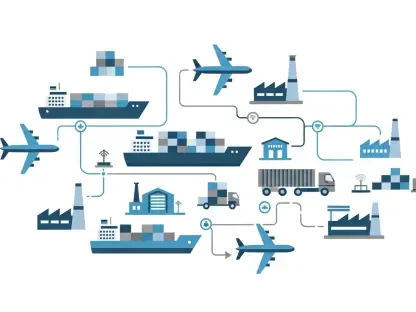Recently, the air cargo industry has faced significant changes due to evolving shipping routes in the Red Sea. Despite these disruptions, the International Air Transport Association (IATA) remains confident in the resilience and growth prospects of the air cargo sector.
Overview of the Air Cargo Industry
The air cargo industry is a cornerstone of global trade, facilitating the rapid movement of goods across continents. Key players such as FedEx, UPS, and DHL dominate the market, offering specialized services that cater to the needs of various industries. Technological advancements, such as automated sorting systems and enhanced tracking capabilities, have revolutionized operations, ensuring greater efficiency and reliability. Additionally, stringent regulations govern the industry, focusing on safety, security, and environmental sustainability.
Key Trends and Market Insights
Primary Industry Trends
Innovation drives the air cargo sector, with emerging technologies like drones and AI-powered logistics systems at the forefront. These advancements are reshaping traditional practices, offering faster and more efficient solutions. Consumer behaviors are also evolving, with a growing preference for e-commerce and faster deliveries, propelling demand for airfreight services. Market drivers include the increasing need for quick transportation of perishable goods and high-value products, presenting substantial growth opportunities.
Market Data and Growth Projections
The air cargo market has demonstrated robust performance in recent years, with consistent growth observed in various segments. Historical data indicates a steady increase in cargo volumes, while projections suggest this trend will continue. The IATA forecasts a 6% growth in air cargo volumes, reflecting the ongoing demand for speedy and reliable delivery services. This positive outlook underscores the sector’s resilience and potential for expansion.
Challenges and Complexities
Technological Challenges
While technological advancements offer numerous benefits, they also present challenges. Integrating new systems requires significant investment and adaptation, potentially disrupting established operations. Moreover, ensuring cybersecurity in an increasingly digital landscape is a critical concern for industry stakeholders.
Regulatory and Market-Driven Obstacles
The air cargo industry must navigate complex regulatory frameworks that vary across regions. Compliance with safety and environmental standards is imperative, adding layers of complexity to operations. Market-driven obstacles, such as fluctuating fuel prices and geopolitical tensions, further complicate the landscape, necessitating strategic planning and flexibility.
Potential Solutions and Strategies
To address these challenges, industry players must invest in cutting-edge technologies and robust cybersecurity measures. Collaborative efforts with regulatory bodies can streamline compliance processes, ensuring smoother operations. Diversifying supply chains and adopting flexible strategies can mitigate the impact of market-driven obstacles, fostering resilience and adaptability.
The Regulatory Landscape
Significant Laws and Standards
The air cargo industry operates under stringent laws and standards designed to ensure safety and security. Regulations governing the transportation of hazardous materials, weight limits, and cargo handling procedures are critical to maintaining industry integrity. Compliance with international standards, such as those set by the International Civil Aviation Organization (ICAO), is mandatory.
Compliance and Security Measures
The importance of stringent compliance and security measures cannot be overstated. The industry adheres to rigorous protocols to prevent smuggling, terrorism, and other illegal activities. Advanced screening technologies and regular audits are employed to uphold high-security standards, safeguarding both cargo and passengers.
Impact on Industry Practices
These regulations have a profound impact on industry practices, influencing operational procedures and investment decisions. Adhering to stringent standards often necessitates substantial investment in technology and training, driving the industry toward greater efficiency and safety.
Future Directions and Implications
Emerging Technologies and Market Disruptors
The future of the air cargo industry is closely tied to the adoption of emerging technologies and the entry of market disruptors. Innovations such as autonomous aircraft and blockchain for supply chain transparency are poised to revolutionize the sector, offering new competitive advantages.
Changing Consumer Preferences
Consumer trends indicate a growing demand for faster and more flexible delivery options. This shift is shaping the industry’s strategic focus, with companies prioritizing speed and reliability to meet evolving expectations. As e-commerce continues to thrive, the reliance on air cargo for swift deliveries is only expected to increase.
Future Growth Areas
Areas poised for significant growth include express shipping services, specialized cargo such as pharmaceuticals, and intra-regional trade. These segments offer promising opportunities for expansion, driven by technological advancements and market demand.
Impact of Global Economic Conditions
The global economic landscape plays a crucial role in shaping the air cargo industry’s future. Economic fluctuations, trade policies, and geopolitical factors will influence market dynamics, necessitating agile strategies to navigate potential challenges and capitalize on growth opportunities.
Conclusion and Recommendations
Key findings highlight the air cargo industry’s resilience amidst potential shifts in the Red Sea shipping landscape. The sector’s reliance on time-sensitive and high-value goods, coupled with the expanding e-commerce market, underscores its enduring significance. Historical and forecasted performance further affirm the industry’s vital role in global trade logistics.
Recommendations for growth and investment emphasize the importance of embracing technological innovations, enhancing cybersecurity measures, and maintaining regulatory compliance. Strategic diversification and flexibility will be essential to navigate economic uncertainties and capitalize on emerging opportunities. By staying adaptive and forward-thinking, the air cargo industry can continue to thrive in an increasingly dynamic global landscape.









